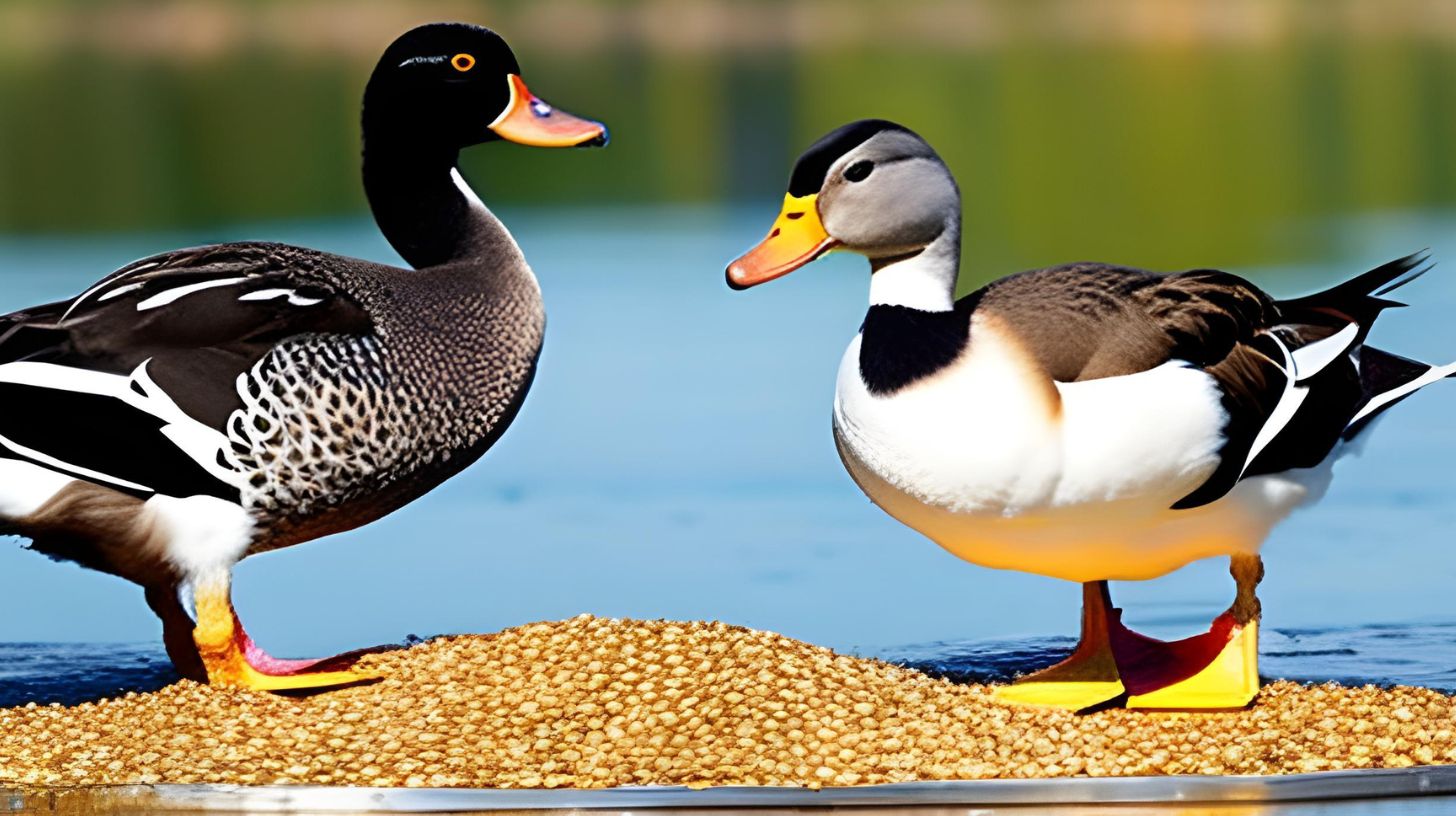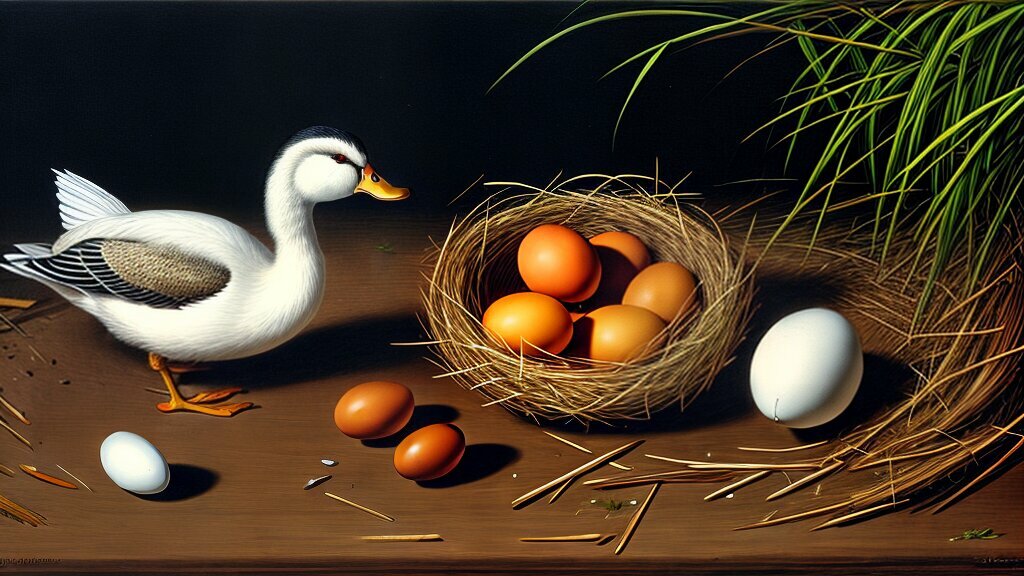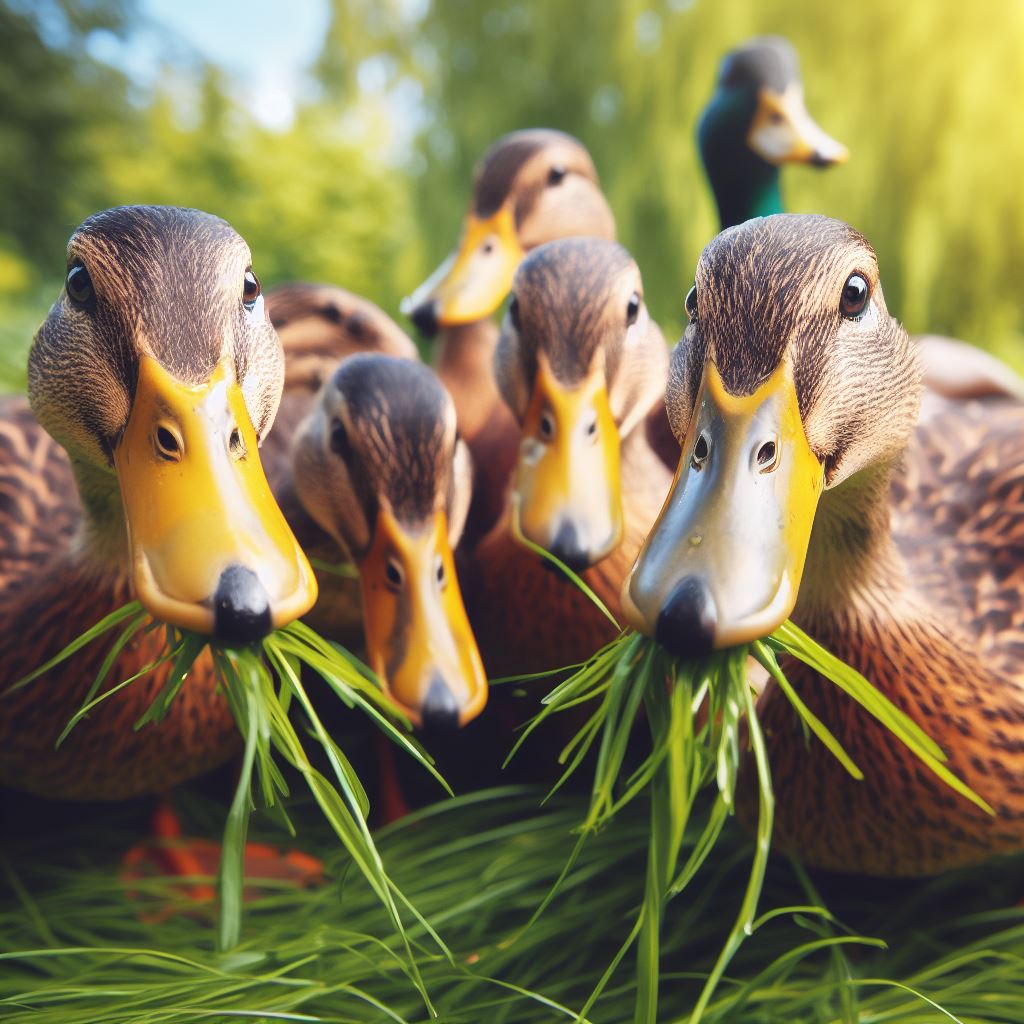Can Ducks Eat Shrimp?

Table of content:
Ducks are aquatic birds that are often found near ponds, lakes, rivers and other waterways. As natural foragers, ducks have a diverse diet consisting of aquatic plants, insects, fish, and other prey. Ducks utilize their broad beaks to catch and filter feed on these food sources.
But can ducks also eat shrimp as part of their diet? Shrimp and other crustaceans are not a typical part of a duck’s menu in the wild. However, some duck owners may offer shrimp to their pets as a supplemental treat.
Below we’ll explore whether or not ducks can or should consume shrimp, including the potential benefits and risks.
Ducks’ Natural Diet
Ducks belong to the bird group known as waterfowl. There are over 120 different duck species, with diverse bill shapes and foraging behaviors adapted to their environments.
As aquatic birds, most ducks have an omnivorous diet consisting of:
- Plants – Aquatic vegetation like duckweed or algae, plus seeds and shoots of land plants
- Insects – Such as mosquito larvae, dragonflies, beetles
- Mollusks – Snails, freshwater clams or mussels
- Crustaceans – Small freshwater shrimp, crayfish, or aquatic insects
- Fish – Small fish and fish eggs
- Amphibians – Frogs, salamanders and other amphibians
Their varied diet provides ducks with essential nutrients like:
- Protein – For growth and muscle development
- Carbohydrates – For energy
- Fats – Also an energy source
- Vitamins and minerals – For metabolic functions and bone health
Ducks have a digestive system adapted to process this natural freshwater diet. They swallow small stones from the bottoms of ponds to help grind up food in their gizzard. Their intestine is relatively short to allow for quick breakdown of easily digestible foods.
Can Ducks Eat Shrimp Shells?
Shrimp are small, aquatic crustaceans that live in both freshwater and saltwater environments. Farmed or wild-caught shrimp are a popular seafood for human consumption.
Shrimp have an outer shell or exoskeleton made of chitin, a fibrous substance that is difficult for many animals to digest. The shell encapsulates the shrimp meat inside.
So, can ducks eat and digest shrimp shells?
While ducks swallow small stones to aid digestion, their digestive system is not equipped to break down chitin shells. Eating whole shrimp or pieces with the shell on poses a significant risk:
- Choking hazard – Shrimp shells could get lodged in a duck’s throat, blocking their esophagus
- Intestinal blockage – Shell pieces could accumulate in the gut, unable to pass through
- Nutritional value – Shells provide little nutritional benefit and just take up space in the digestive tract
For these reasons, it’s recommended to completely remove shrimp shells before feeding shrimp to ducks. Shell fragments should not be allowed as they can still pose choking or blockage risks.
Can Ducks Eat Shrimp Tails?
Shrimp tails are softer and more pliable than the main shell. But they still contain some chitin and present a similar choking hazard.
Smaller, soft-billed duckling may be especially at risk from getting shrimp tails stuck in their throat. Adult ducks with larger bills can likely swallow shrimp tails more safely.
But there is still a potential for:
- Tail pieces getting lodged in the esophagus
- An intestinal blockage if enough tails accumulate
So while not as risky as whole shells, it’s still best to remove shrimp tails before feeding ducks whenever possible.
Can Ducks Eat Cooked Shrimp?
Cooking shrimp provides some benefits when feeding it to ducks:
- Kills bacteria – Raw shrimp may contain pathogens like salmonella. Cooking helps destroy bacteria.
- Softer texture – Heat can partially break down the shells and tails, reducing choking risk.
- Enhances flavor – Cooking makes shrimp more palatable and aromatic.
However, cooking does not necessarily fully dissolve the shells. Cooked shrimp may still contain indigestible fragments that pose a hazard.
Feeding cooked shrimp is safer than raw, but removing shells and tails is still the best way to mitigate risks. Lightly steaming or boiling shrimp can help loosen shells for easier removal.
Can Ducks Eat Raw Shrimp?
Ducks are less adapted to eat raw meat and seafood than people. Raw shrimp straight from the ocean or market likely contains:
- Bacteria – Salmonella, E. coli, Vibrio and other pathogens
- Parasites – Shrimp tapeworms
- Antimicrobial chemicals – Such as sulfur compounds
These substances are neutralized or destroyed during cooking. Consuming raw shrimp introduces significant risk of intestinal illness in ducks.
However, some nutrients in shrimp are lost during cooking:
- Protein – Heat denatures and degrades proteins
- Vitamin C – Easily damaged by heat and water
- Thiamine – Also known as Vitamin B1, sensitive to heat
So raw shrimp may provide slightly more nutrition, but the safety risks likely outweigh this benefit for ducks. Cooked shrimp is the smarter choice.
Can Baby Ducks Eat Brine Shrimp?
Brine shrimp are a tiny species of crustacean that live in saltwater lakes and ponds. They are much smaller than typical shrimp harvested for human use.
Brine shrimp are commonly used as live feed for aquarium fish. They can also be a good supplemental food for young ducklings.
Some key advantages of brine shrimp for baby ducks include:
- Tiny size – Rather than choking hazard, brine shrimp are easy for ducklings to consume whole.
- Soft shell – The thin shell is easily digested by ducklings.
- Nutritious – Good source of amino acids, omega-3s, and other nutrients for growth.
Brine shrimp should be fed live, or frozen then thawed, to preserve nutritional value. Ducklings seem to eagerly pursue the tiny movements of live brine shrimp in particular.
When very young, ducklings should be limited to mostly starter feed or poultry feed. But supplementing with brine shrimp provides added protein, mimicking their natural insect diet.
Can Ducks Eat Dried Shrimp?
Dried shrimp is sometimes used as a poultry treat or supplement, though more commonly for chickens. Dried shrimp is cooked and dehydrated, with a very long shelf life.
For duck owners considering dried shrimp, some pros and cons exist:
Pros:
- Long-lasting treat
- Low risk of spoilage
- No preparation required
Cons:
- Very high sodium content
- Still may contain shell fragments
- Lacks moisture and aroma of fresh shrimp
The main risk of dried shrimp is the salt content. Most dried shrimp is extremely salty, with sometimes over 1500 mg of sodium per serving. Too much sodium can lead to kidney problems and salt toxicity in ducks.
So while very convenient, dried shrimp should only be fed in strict moderation to limit sodium intake.
Can Baby Ducks Eat Shrimp?
Young ducklings have some additional risks and challenges in eating whole shrimp:
- Underdeveloped immune system – More vulnerable to bacteria in raw shrimp
- Smaller throat and esophagus – Higher choking potential on shells or tails
- Rapidly growing bones – Excess sodium may impair bone health
For these reasons, most avian experts recommend waiting until ducks are fully grown before feeding them shrimp.
If offering shrimp to ducklings, follow these precautions:
- Cook shrimp fully to eliminate bacteria
- Remove all shells, tails, veins and debris
- Chop shrimp into tiny pieces for easy swallowing
- Feed only small quantities initially
With extra precautions, tiny amounts of prepped shrimp can be an occasional treat for ducklings after the first few weeks of life. But starter feed or poultry feed should remain their dietary staple while growing.
Nutritional Value of Shrimp for Ducks
Here is how shrimp may contribute to a duck’s nutritional needs:
- Protein – Shrimp contain 15-20% protein per serving. Quality amino acids support muscle growth.
- Fats – Shrimp have some monounsaturated and omega-3 fatty acids for energy.
- Vitamins – Decent source of B vitamins like B12, selenium, and others.
- Minerals – Provide magnesium, potassium, copper and more.
- Carotenoids – Antioxidants like astaxanthin for immunity and coloration.
However, ducks’ digestive systems are not designed to obtain full nutrition from seafood. Plant material should still make up the bulk of their diet.
Shrimp serve better as an occasional supplemental food rather than a dietary staple. They provide diversity from ducks’ usual fare.
Risks and Challenges of Feeding Shrimp
While shrimp can provide some nutritional value, some cautions are in order:
- Choking hazards – Shells and tails pose major choking risks if swallowed.
- Intestinal blockage – Duck intestines could become clogged with indigestible parts.
- Bacteria – Potential for salmonella, E. coli and other pathogens from raw shrimp.
- Parasites – Shrimp tapeworms may infect ducks and cause vitamin deficiencies.
- Allergies – Some ducks may have allergic reactions to shellfish.
- Sodium content – Excess salt from shrimp could lead to toxicity.
With proper preparation and moderation, these risks can be managed. But improper feeding of shrimp could be detrimental.
Conclusion
Can ducks eat shrimp? In moderation, shrimp can offer a supplemental source of protein, healthy fats, and micronutrients for ducks. However, their digestive system is not designed to thrive on crustaceans.
Feeding shrimp to ducks also poses some risks, especially from indigestible shells. But cooking, chopping, and removing shells and tails can mitigate these hazards.
Baby ducks can eat brine shrimp, but adult shrimp should be avoided until they are grown. Even then, shrimp should just be an occasional treat, not a dietary foundation. Sticking primarily to poultry feed, produce, and natural forage will keep ducks happiest and healthiest overall.
Welcome. I’m Adreena Shanum, the proud owner of this website, and I am incredibly passionate about animals, especially poultry. I founded adreenapets.com as a labor of love, stemming from my desire to share my knowledge and experiences with poultry enthusiasts worldwide.




